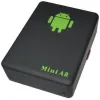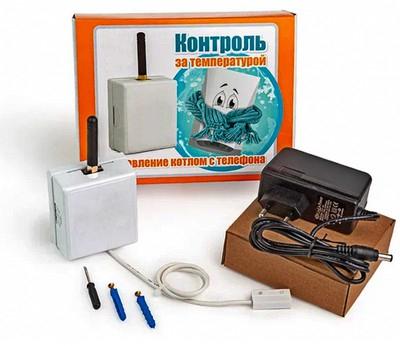
Instruction manual for configuration and operation of the GSM thermostat KotelOK
Руководство / инструкция
Instructions for Configuring the GSM Module "Kotel.OK"

❗👉➨ ATTENTION! Before beginning configuration, please carefully read the entire instruction manual and only then proceed with the device setup.
During the setup process, exercise caution and follow electrical safety regulations.
1. Open the device cover:
to do this, press the side of the case as shown by the arrows in the picture and pull the cover towards yourself.
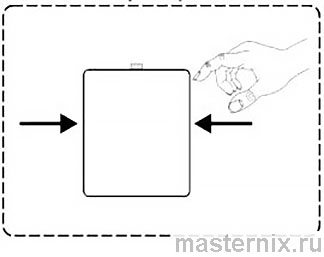
On the inside of the device cover, the purpose of the terminal block, the method for requesting temperature sensor readings, and the technical support number (8-804-333-90-80) are shown.
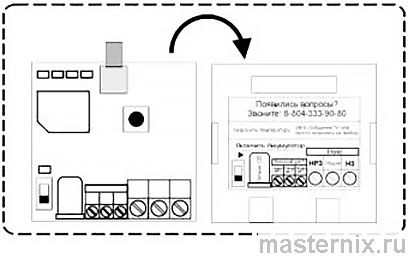
2. Screw the antenna onto the device:
to do this, insert the antenna into the special connector and turn clockwise.
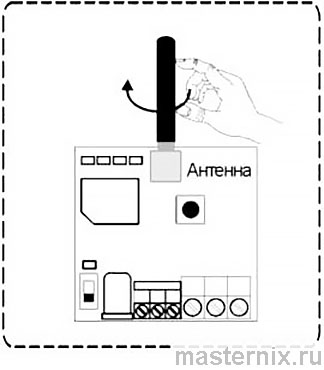
3. Slide the SIM slot cover to the right and open it as shown in the picture:
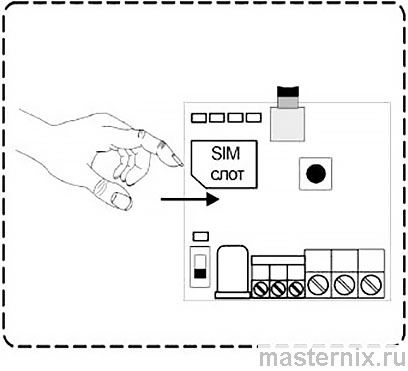
4. Insert the SIM card into the SIM slot as shown in the picture:
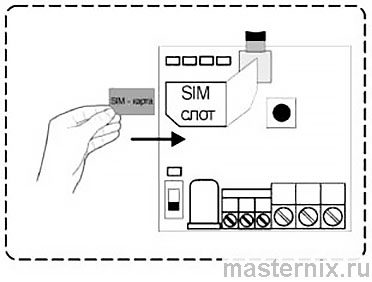
5. Close the SIM slot cover and slide it to the left as shown in the picture:
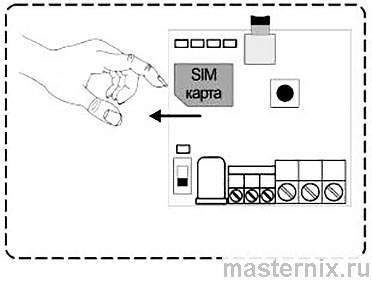
❗👉➨ ATTENTION! The SIM card PIN code must be disabled. All SMS messages must be deleted from the SIM card memory.
6. Connect the adapter to the device and plug the adapter into a 220V outlet.
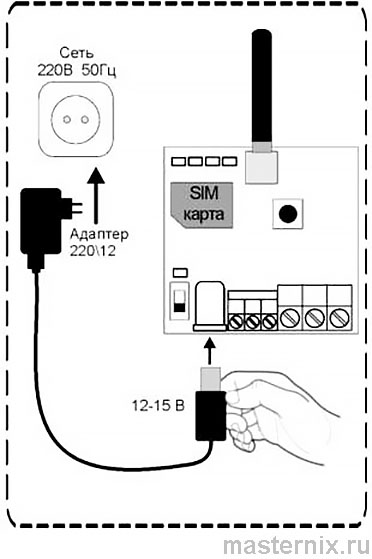
7. The "Power" indicator will light up. Switch the "Battery" switch to the ON position, after which the "Battery" indicator will light up:
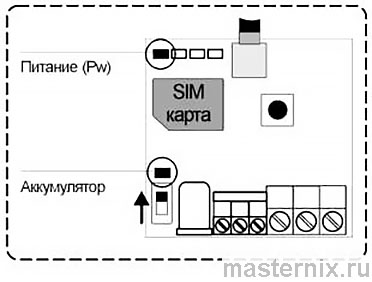
8. Wait until the device registers on the network (the GSM indicator will light up). (Approximately 10 seconds)
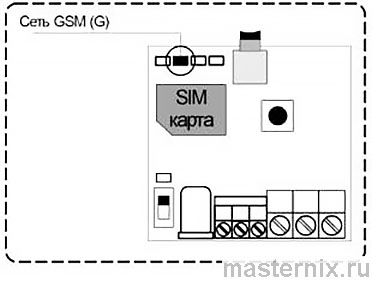
If the "G" and "Pr" indicators are blinking, this means the GSM module KotelOK did not detect a SIM card in the slot. Turn off the device power. Ensure that the SIM card is properly installed in the SIM slot. Repeat the instructions starting from step 3.
If the "G" indicator does not light:
- Turn off the device power.
- Remove the SIM card from the device.
- Insert the SIM card into a phone and make sure it is activated, the balance is positive, the PIN code is disabled, and the network signal strength is above 30%.
- Repeat the instructions starting from step 3.
9. When the device is turned on, if the phonebook is empty, after the GSM indicator (10 seconds) the “Setup” indicator lights up. The device indicates it is in programming mode.
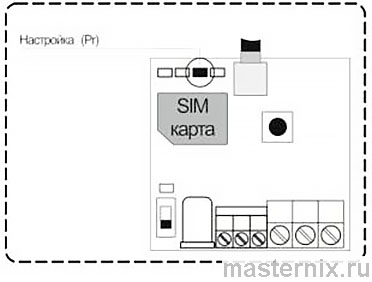
If the “Pr” indicator does not light:
- Press and hold the “Setup” button. The indicator will blink 3 times and turn off;
- Switch the “Battery” switch to the “OFF” position;
- Disconnect the main power adapter. The device will turn off;
- Repeat the instructions starting from step 4.
10. Call the device from your mobile phone (your number will be recorded in the device memory and used for notifications).
The device will reject the incoming call, the “Pr” indicator will turn off. You will receive an SMS message on your mobile phone: “Phone recorded. Alarm temperature thresholds set for built-in sensor Tmin=10 Tmax=35.”
DEFAULT SETTINGS:
Your phone number is recorded in the first memory cell of the device.
Default alert thresholds:
- upper threshold +35 degrees Celsius.
- lower threshold +10 degrees Celsius.
This means:
- if the temperature exceeds 35 degrees you will receive an alert SMS message (T1=+35°C).
- if the temperature drops below 10 degrees you will receive an alert SMS message (T1=+10°C).
In the event of a power outage, you will receive an SMS message: “Main power disconnected, operating on battery.”
When power is restored (after outage), you will receive an SMS message: “Power restored.”
To check the device status (temperature sensor readings, power status, cellular network signal level) call the number of the SIM card installed in the device. The SIM card will reject the call and reply with an SMS message containing:
Relay off - state of the built-in relay
T built-in = 25°C - built-in temperature sensor reading (for example 25°C)
T external = Off - external temperature sensor reading (disconnected)
Power OK - device power status (OK/off)
GSM Level = 80% - GSM network signal strength (from 0 to 100%)
❗👉➨ ATTENTION! The built-in temperature sensor readings may differ from the actual value by ±1 degree, as the sensor is located inside the device housing.
The device is configured and ready for operation.
If you wish to change the default settings or use the GSM module Kotel.OK to control heating devices or as a remote switch, please read the operation manual.
Operation Manual for GSM Module "Kotel.OK"
Description
The GSM module "Kotel OK" (hereinafter: “device”) has the following functionalities:
- monitoring the room or heat carrier temperature in the heating system;
- controlling heating equipment;
- monitoring power supply interruptions;
- the ability to use the device as a remote wireless switch.
The device includes a built-in temperature sensor to monitor room temperature. Additionally, an external temperature sensor can be connected. The built-in GSM module notifies when the temperature falls below the minimum threshold or exceeds the maximum threshold. The built-in power relay can control heating equipment or be used as a wireless switch.
Package Contents
1 GSM device "Kotel OK": 1 pc.
2 Setup and operation manual: 1 pc.
3 GSM antenna: 1 pc.
4 Power supply 12V: 1 pc.
5 Installation kit: 1 pc.
Device Elements Description:
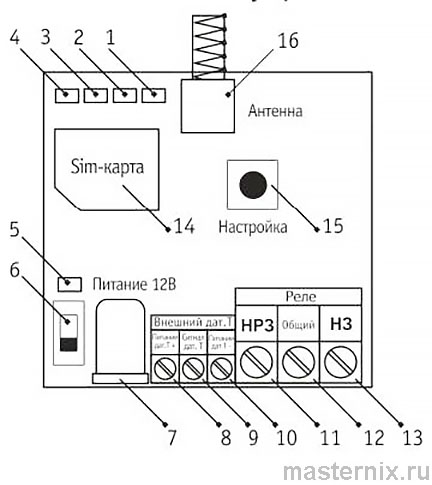
1 Heating / Relay
When heating/relay is on, the indicator lights.
2 "Setup" Indicator
Lights up in programming mode.
3 "GSM" Indicator (Green)
GSM network indicator. Lights when network is available. Blinks once every 2 seconds when searching or network is absent.
4 "Power" Indicator (Green)
Main power indicator. Lights when power is present.
5 Battery (Green)
Backup power indicator. Lights when powered by backup battery (even if main power is on).
6 "Battery" Switch
Backup power switch. In the "On" position: when main power is present, the battery charges; when main power is off, the device operates from the battery.
7 Power (Adapter)
Power supply connector.
8 Sensor Power +
Power supply for external temperature sensor (“+”).
9 Sensor Signal
Signal contact for external temperature sensor.
10 Sensor Power -
Power supply for external temperature sensor (“-”).
11 Relay NO (Normally Open)
Normally open relay contact.
12 Relay Common
Common relay contact.
13 Relay NC (Normally Closed)
Normally closed relay contact.
14 SIM Card Slot
Slot for SIM card installation.
15 "Setup" Button
Button to enter phone number programming mode.
16 Antenna Connector
Connector for GSM antenna (SMA connector).
.
Technical Specifications
Number of temperature sensors (digital temperature sensors DS18B20 are used): 1 built-in, 1 external
Measuring temperature range (for external sensor): from -55 to +125 °C
Number of outputs (Relay, changeover contact, maximum load 10A/220V): 1
Power supply voltage: mains adapter with 12V, 1A output
Current consumption at 12V power supply: 50mA
Operating temperature range: from -30 °C to +55 °C
Humidity: not exceeding 85%
Overall dimensions: 62 mm (length) x 67 mm (width) x 31 mm (height)
Weight not more than: 100 g
Antenna connector: SMA
Number of phone numbers for notification: 5
Built-in battery capacity: 100 mAh
The device includes a quad-band GSM module (EGSM850/900/1800/1900 MHz). Class 4 (2W/900 MHz). Class 1 (1W/1800 MHz).
Connecting the External Temperature Sensor:
If necessary, an external temperature sensor (based on the DS18B20 microchip) can be connected to the device.
Upon connection, the sensor automatically begins measuring temperature. Default alarm temperature thresholds are set automatically: Tmax +35 °C (upper threshold), Tmin +10 °C (lower threshold).
❗👉➨ ATTENTION! All connections must be performed with the device power turned off.
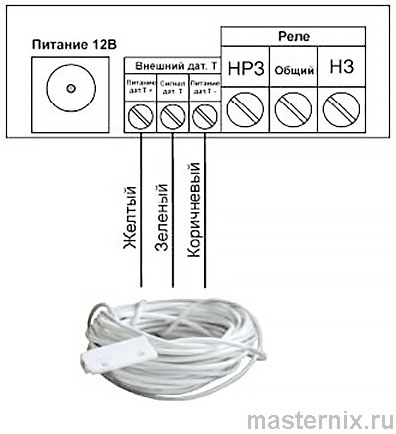
Device Status Request:
Device status information can be requested by two methods:
1) calling the SIM card number installed in the device;
2) sending an SMS message (using Latin characters): S, where S is the command code for status request.
The first line of the response message may vary depending on the device operating mode:
"Room temperature maintenance" mode — the parameter "Heating" is displayed.
"Wireless switch" mode — the parameter "Relay" is displayed.
If temperature maintenance mode is not active, the "Relay" parameter is displayed.
Response:
➠ Heating x or Relay x (depending on the device operating mode): On / Off
➠ T built-in = x °C: Temperature value (from -55 to +125) / Off
➠ T external = x °C: Temperature value (from -55 to +125) / Off
➠ Power x: OK / Off
➠ GSM Level = x %: GSM network signal level (from 0 to 100)
Example #1:
➠ Relay Off
➠ T built-in = 25 °C
➠ T external = Off
➠ Power OK
➠ GSM Level = 80%
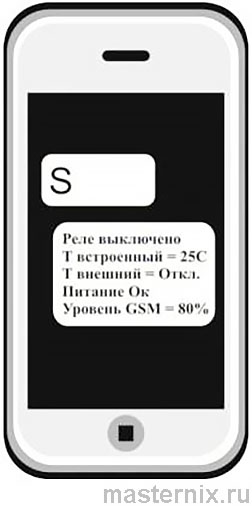
Meaning:
➠ Relay is off or not in use,
➠ Built-in temperature sensor reading is 25 °C,
➠ External temperature sensor is disconnected,
➠ Powered by mains,
➠ GSM signal strength is 80%.
Example #2:
➠ Heating On
➠ T built-in = 25 °C
➠ T external = 27 °C
➠ Power Off
➠ GSM Level = 80%
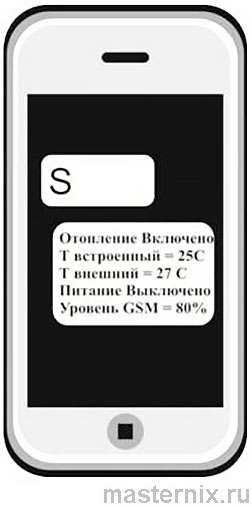
Meaning:
➠ Heating is on,
➠ Built-in temperature sensor reading is 25 °C,
➠ External temperature sensor reading is 27 °C,
➠ Powered by battery,
➠ GSM signal strength is 80%.
Temperature Threshold Settings for Notifications:
To change the default temperature notification thresholds, send an SMS message (using Latin characters):
| Command Text | Description | Example |
| UTn=x,y | UT – command code for setting temperature threshold for notification. n – temperature sensor number (1 – built-in, 2 – external). x – lower notification threshold (from -55 to +125). y – upper notification threshold (from -55 to +125). |
UT1=+5,+45 Sets notification thresholds for the built-in sensor: lower +5, upper +45. |
You will receive an SMS response:
“Alarm temperature thresholds for built-in sensor set Tmin=5 Tmax=45”.
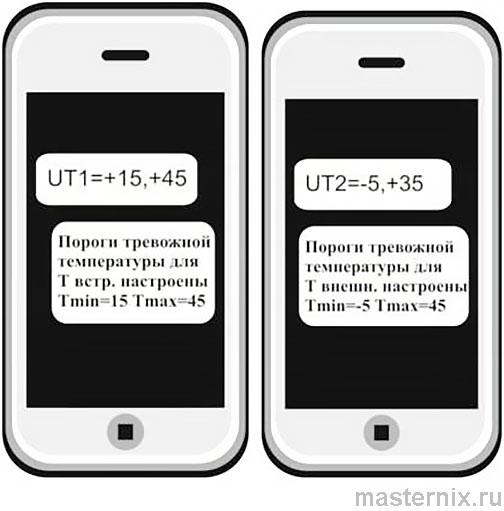
Heating Equipment Control:
The device can control heating equipment, i.e., maintain a specified temperature:
- gas boiler with electronic control unit
- electric boiler with electronic control unit
- electric heating device without an electronic control unit with power up to 2 kilowatts.
Control principle:
The module is connected to the boiler with 2 wires to the external thermostat terminals.
You send a command (see below) from your phone with the temperature value to be maintained.
The device measures the temperature using the built-in or external temperature sensor.
When the temperature falls below the set threshold, the GSM module Kotel.OK closes the relay contacts and the heating device turns on.
When the heating reaches the set value, the device commands to turn off the heating.
Connection diagram: gas boiler with electronic control unit:
❗👉➨ ATTENTION! All connections must be performed with the device power turned off.
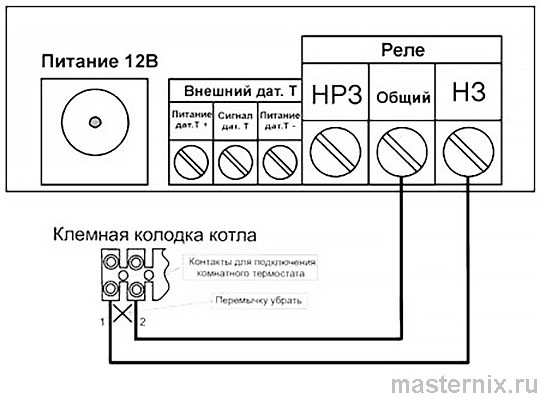
Connection diagram: electric heating device:
❗👉➨ ATTENTION! All connections must be performed with the device power turned off.
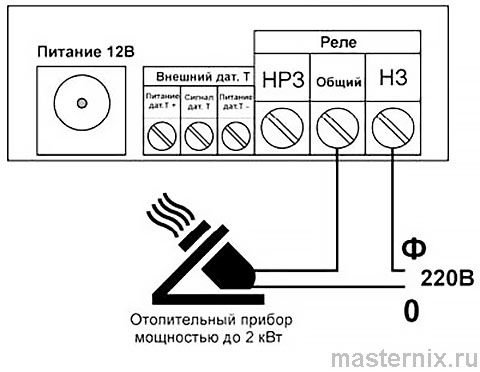
Control Commands:
To set the temperature control threshold using the built-in sensor, send an SMS message with the following text (Latin characters):
| Command Text | Description | Example |
| T1=x | T1 – control code for temperature by built-in sensor; x – temperature value to maintain (from -55 to +125 °C). |
T1=+15 – maintain +15 °C using the built-in temperature sensor. |
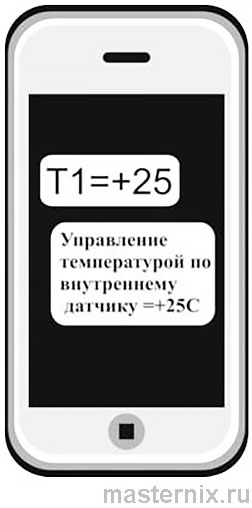
Response SMS:
“Temperature control by built-in sensor =+15°C”
To set the temperature control threshold using the external sensor, send an SMS message with the following text (Latin characters):
| Command Text | Description | Example |
| T2=x | T2 – control code for temperature by external sensor; x – temperature value to maintain (from -55 to +125 °C). |
T2=+15 – maintain +15 °C using the external temperature sensor. |
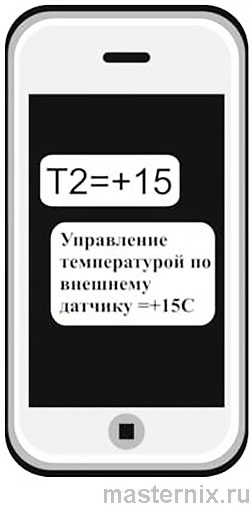
Response SMS:
“Temperature control by built-in sensor =+15°C”
❗👉➨ ATTENTION! When switching to temperature control by the external sensor, control by the built-in sensor is automatically disabled. Conversely, when switching to temperature control by the built-in sensor, control by the external sensor is automatically disabled.
Remote Temperature Sensor Deactivation
To remotely disable a temperature sensor, send an SMS message (Latin characters):
| Command Text | Description | Example |
| Px0 | P – sensor disable command code; x – temperature sensor number (1 or 2). |
P10 – disable built-in temperature sensor; P20 – disable external temperature sensor. |
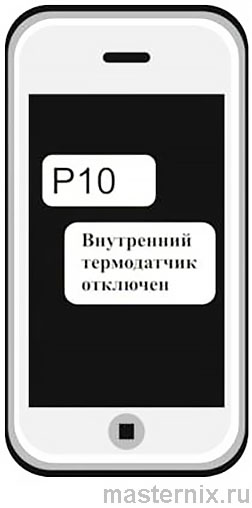
Response SMS:
“Built-in temperature sensor disabled” or “External temperature sensor disabled”.
If a sensor was disabled and needs to be enabled, send an SMS message:
| Command Text | Description | Example |
| PX1 | P – sensor enable command code; x – temperature sensor number (1 or 2). |
P11 – enable built-in temperature sensor; P21 – enable external temperature sensor. |
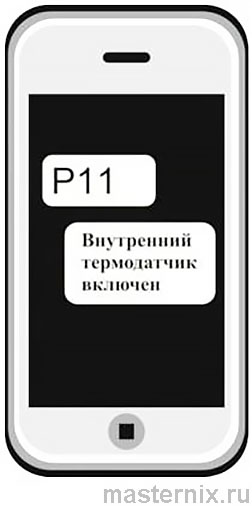
Response SMS:
“Built-in temperature sensor enabled” or “External temperature sensor enabled”.
Add / Change / Delete Phone Numbers in Device Memory:
To add a phone number, press and hold the “Setup” button for 2 seconds until the “Pr” indicator lights up.
Call the SIM card number installed in the device from your mobile phone (your number will be saved in the device memory and used for notifications).
The device will reject your call and the “Setup” LED will turn off.
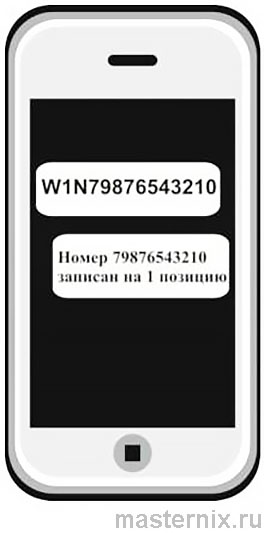
The device will send a response SMS, for example:
“Number 79201112233 recorded in position 2” – the phone number is saved in the device memory. (Maximum 5 positions).
You can change or add phone numbers to the notification list by sending an SMS message (Latin characters):
| Command Text | Description | Example |
| WpNxxxxxxxxxxx | W – phone number write command code (Latin letter W); p – position to write the number (from 1 to 5); N – separator; xxxxxxxxxxx – phone number in international format without the “+” sign. |
W1N79201112233 Write phone number +79201112233 to position 1 in the device phonebook. |
Response SMS:
“Number 79201112233 recorded in position 1” – the phone number is saved in the device memory.
To delete a phone number from the device phonebook, send an SMS message with the text (Latin characters):
| Command Text | Description | Example |
| Dp | D – phone number deletion command code (Latin letter D); p – position to be cleared (from 1 to 5). |
D2 Delete position 2 from the device phonebook. |
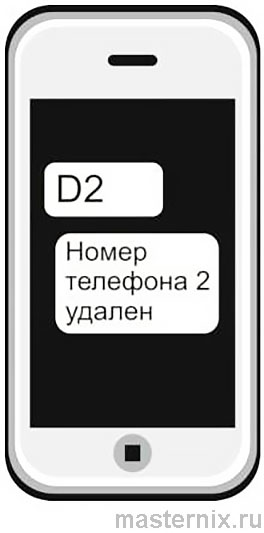
Response SMS:
“Phone number 2 deleted” – the phone number was deleted from the device memory.
Requesting SIM Card Balance:
To check the balance, send the following SMS message (Latin characters):
| Command Text | Description | Example |
| B*nnn# | B – balance request command code; nnn – number used for balance inquiry (check with your cellular operator). |
B*100# Request balance. |
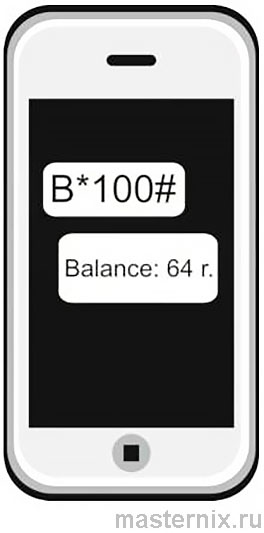
Possible response:
The device will reply with the current balance.
Requesting Current Settings:
To request current settings, send an SMS message with the text (Latin characters): N,
where N is the command code for querying current settings.
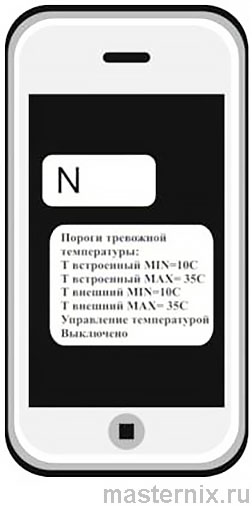
The device will respond with an SMS message:
Alarm temperature thresholds:
Built-in sensor MIN=10°C - 1
Built-in sensor MAX=35°C - 2
External sensor MIN=10°C - 3
External sensor MAX=35°C - 4
Temperature control status Off - 5
1. Lower notification threshold for built-in sensor from -55 to +125 (e.g., 10°C)
2. Upper notification threshold for built-in sensor from -55 to +125 (e.g., 35°C)
3. Lower notification threshold for external sensor from -55 to +125 (e.g., 10°C)
4. Upper notification threshold for external sensor from -55 to +125 (e.g., 35°C)
5. Relay status. Possible responses:
- Temperature control off – temperature maintenance by sensors disabled.
- Maintaining temperature by built-in sensor = 25°C (e.g., 25°C).
- Maintaining temperature by external sensor = 25°C (e.g., 25°C).
Using the Device in Remote Relay Mode (GSM Switch):
The device can be used as a remotely controlled relay (i.e., as a remote switch).
The device contains a built-in relay that can switch loads up to 2 kW (current up to 10A, voltage 220V).
❗👉➨ ATTENTION! If the GSM module KotelOK is used as a remote switch, temperature control will be automatically disabled; however, temperature alert threshold monitoring for high/low temperature will remain active.
Connection diagram for heating equipment in remote relay mode:
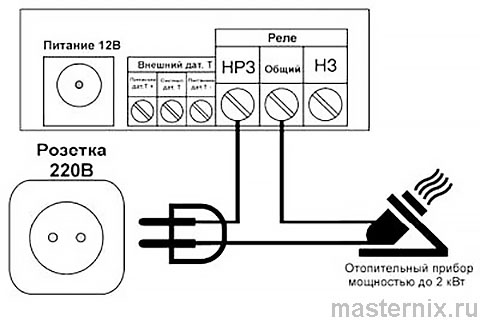
❗👉➨ ATTENTION! All connections must be performed with the device power turned off.
To turn the relay on or off, send an SMS message (Latin characters):
| Command Text | Description | Example |
| V=1 | Turn relay ON | V=1 – relay ON |
| V=0 | Turn relay OFF | V=0 – relay OFF |
Response SMS when turning ON: “Relay ON. Temperature control OFF.”
Response SMS when turning OFF: “Relay OFF. Temperature control OFF.”

❗👉➨ ATTENTION! To switch the relay back to temperature control mode, send a command to enable temperature maintenance at the set threshold (see section "Heating Equipment Control").
Remote Device Reboot:
To remotely reboot the device, send an SMS message with the text (Latin characters): R
Upon receiving this command, the module will reboot.
Device Memory Reset:
To erase the device memory and reset the settings to factory defaults, press and hold the “Setup” button for at least 5 seconds. When pressed, the “Pr” LED will light, then blink 3 times and turn off – this indicates the device memory has been completely erased and it is ready for reconfiguration.
